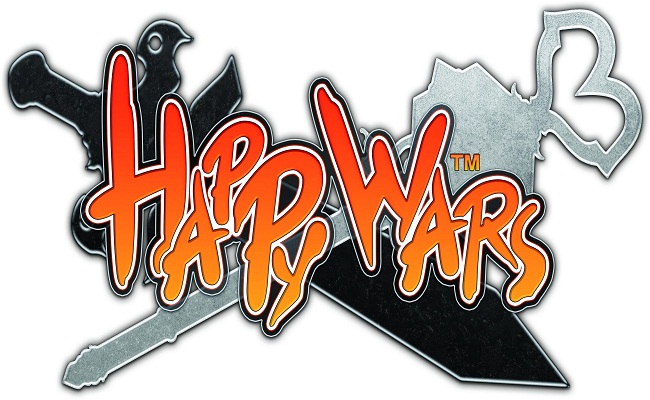Free to play games. A blessing for young gamers with little money? A curse that undercuts developers who want to sell good games at fair prices? However you view them, this new business model has spread virulently through the PC and mobile market over the last few years. Now it has come to consoles with the Xbox 360 Arcade game Happy Wars.
Happy Wars can be downloaded for free, played single-player or online, and players don’t need to spend a cent (Aside from the Xbox Live Gold subscription fee, of course). It’s a third person action RPG that uses the MOBA (Multiplayer Online Battle Arena) format seen in games like League of Legends on PC, or Awesomenauts which might be more familiar to Xbox users.
Players choose a character from three classes, customize their appearance, equip loot, then head out with a large team of other players to fight strategic battles in which two opposing teams try to capture towers around a map. The two armies capture these spawn points until one manages to penetrate the other team’s base and destroy their central tower.
Characters level up over the course of each battle, gaining new abilities that can only be used during that specific fight. However there is also a persistent leveling system that determines which pieces of loot can be equipped, and this loot can be upgraded between battles. Experienced players gain an edge from their loot, while skillful lower-level players can still compete thanks to the powers that level up on each mission.
And all of this fun can be had for free.
HOWEVER…
Loot is determined randomly. At the end of each battle, players get a reward of in-game money called Stars which can be used to spin a wheel that may or not give out an item. Spending more stars increases the chances of a payout, and players can also increase the chance of a particular type of item (Weapon, shield, etc). The stars are given out to all players at the end of a battle, but there is also a form of premium currency called Tickets.
Tickets can be used to purchase specific items from the store, bypassing the randomization, and these tickets can only be acquired with real-world money (Microsoft Points).
With this sort of free to play multiplayer game, there is always the concern that it will become “Pay To Win”, meaning that players who fork over a few dollars will gain a clear edge over people who don’t, and people who pay a lot of money will dominate everyone else regardless of skill. Happy Wars mostly avoids this pitfall, but still veers dangerously close.
The premium items aren’t necessarily more powerful than the random items, but there is a distinct advantage to being able to pick exactly what items you want for your preferred class. A five dollar expenditure will buy enough equipment to outfit one class very well.
There is also a feature where players can choose to respawn with bonuses in the middle of a match, and this can be done by expending either form of currency. So, while free players could do it, players who spring a few real dollars on premium Tickets can respawn with extra power more often.
Happy Wars is of special interest to parents, though. It will keep kids entertained for free, and it is very cute with a child-friendly aesthetic. The single-player story is full of whimsical humor, and the characters are adorable little doll-people who remain cute even when dying, or killing each other.
Parents looking for a cheap game that can provide long-term entertainment should introduce their young ‘uns to Happy Wars, and dangle a few Tickets in front of their noses as a reward for good behavior.
As the first (And only, as of this writing) free to play game on the Xbox, it’s worth taking a look at Happy Wars. It definitely isn’t going to pull anyone away from League of Legends, but it still provides a few hours of chaotic, addictive fun for free.


0 Comments